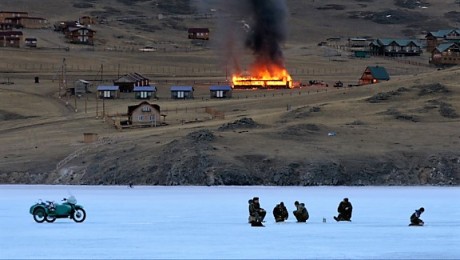


Viktor Kossakovsky at His Best

… and when that is the case, like last night at DocsBarcelona, the participants get a memorable treat at a masterclass from a master, who has a lot to say about filmmaking. And who is a performer, who knows how to entertain.
I was the moderator of the almost two hour session, an easy job. I started reminding Kossakovsky about Bornholm, the Danish island in the Baltic Sea, where in 1997 he showed «Wednesday» at the Balticum Film & TV Festival, the film where he finds people born in Leningrad on the same day and the same year as himself: 1961. He remembered it and he also remembered that I was hesitant to say if I liked the film or not… right he was, it is not my favourite film from Kossakovsky. But what a memory he has!
And it was on Bornholm that «Aquarela» was born. The director was editing „Pavel and Lalya“ there, the film about one of his heroes, director Pavel Kogan, and his wife, shot in Tel Aviv, where they lived at a moment, where Pavel was about to leave this world. The editing took place in Svaneke, where the Baltic Media Centre was situated at that time, the organisation behind the festival and workshops for Baltic and Russian filmmakers and journalists.
Kossakovsky told us last night that in Svaneke he was looking at the Baltic sea from his window, fascinated by the waves and the changing colours of the sea. He told BBC’s Nick Fraser, who was helping him a lot at that time, about it – Fraser said that noone will watch a film like that! I would probably have said the same…
Viktor Kossakovsky went home to Saint Petersburg looking out another window, the one from his flat, which became the film «Tishe!».
From these flashbacks Viktor Kossakovsky, with the help of several questions, went to «Aquarela» and the many stories he could tell about how he «read» the nature. The speed of the icebergs, how to film them, how to stabilise the cameras on board the boat in stormy weather, and a long talk about the cars on the ice and the one, who falls into the water, gets up and is helped by the director’s first assistant, who was on stage at the opening night, Ainara Vera. Very moving.
He also talked about the sequence with the waterfall – and shocking to me and others, he said that the editing of the film, which he had «learned by doing» at his time at film school and by helping Russian director Sokurov – the editing of «Aquarela» took 2 weeks! Whereas the sound & music editing took half a year!
It was great to hear the director talk warmly about his team, carefully «casted» for the job, their professionalism and dedication – and how they had to cheat a bit the producer to make more risky things out their in the wilderness, the beautiful planet that we are so good in destroying.
There are two more screenings of “Aquarela” at the festival, check this
http://www.docsbarcelona.com/en/doc/aquarela/
… and the film goes on a cinema in the USA, starting in August – and a Danish premiere, sorry for being “red & white”, will take place in September.